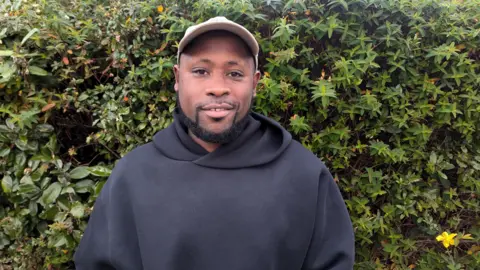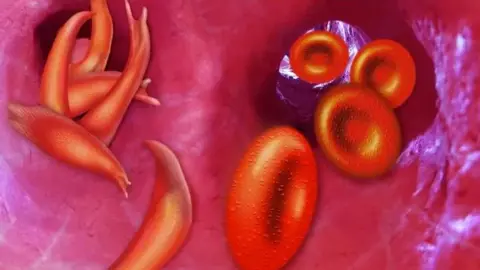'You exclude yourself, don’t want to be a burden'
A man with sickle cell disease is urging people to be more understanding of invisible illnesses.
Rayan Wilson, from St George in Bristol, said the condition could affect every aspect of his life by causing severe pain and mobility issues, often without warning.
The father of three children has taken part in a documentary called The Primrose Files: Sickle Cell Warrior, which aims to increase awareness of the disease.
“I don’t think anyone with sickle cell is asking for a miracle cure - we’re asking for people to participate in being more aware," Mr Wilson said.

"You end up excluding yourself from a lot because you don’t want to be a burden."
He said he experienced "sickle cell crises", a term people use to describe "explosions" of excruciating pain in the body.
"You feel this build up [of pain] in particular joints and muscles and you start to realise that this part of my body is not working as it normally does," he said.
"I might lose the ability to stand, I might lose the ability to feel the floor properly and then all of a sudden it feels like I’m walking on hot coals or I’m walking on pins."
 Science Photo Library
Science Photo LibrarySickle cell disease is a group of inherited health conditions that affect the red blood cells, according to the NHS.
Those with the disease produce abnormally shaped red blood cells that have a shorter lifespan and can block blood vessels.
Mr Wilson inherited the condition from his parents who both carry the gene, although they do not suffer with it themselves.
Although Mr Wilson's family and friends are aware of his condition, he says it does not stop him from living with feelings of anxiety over when the next flare up will be.
"If you’re out on a social and you feel [pain] coming, you have to have that awkward conversation of ‘I’ve got to leave’ - but you look normal and appear normal," he said.
He added that when the pain begins, it is only a matter of time before he is left bedbound.
Mr Wilson hopes the documentary will help people develop a better understanding of sickle cell disease.
“People know [you have sickle cell], but they don’t know what you’re going through," he said.
Genomics England funded the documentary that Mr Rayan has taken part in.
The company was launched in 2013 to help the UK government's plan to sequence 100,000 genomes and incorporate genomic medicine into routine NHS care - which was achieved in 2018.
A spokesperson from the company said there was a "limited understanding" of how and why sickle cell disease affected people so differently.
"This can make it difficult to find the best treatment for each person and many people living with it often face stigma and can struggle to get the support they need," they said.
“The perspectives and experiences of those living with sickle cell, such as Rayan’s, are vital to making much-needed progress and raising awareness.
“We’re grateful to everyone who shared their stories of living with sickle cell, ensuring greater visibility of this condition."
Follow BBC Bristol on Facebook, X and Instagram. Send your story ideas to us on email or via WhatsApp on 0800 313 4630.
